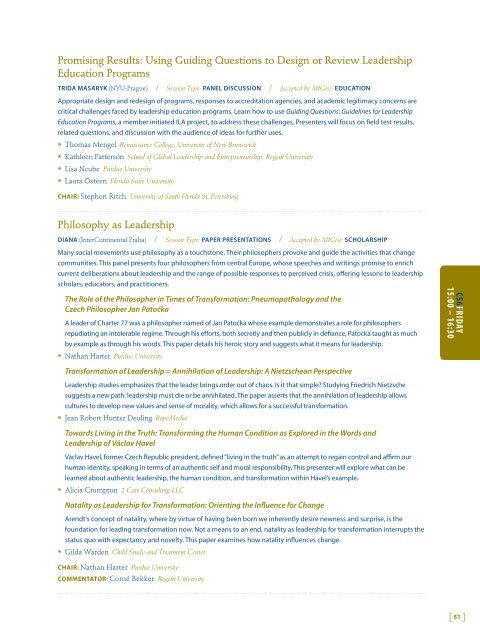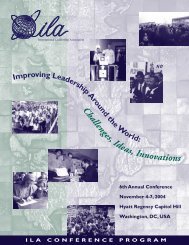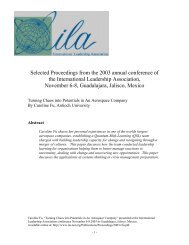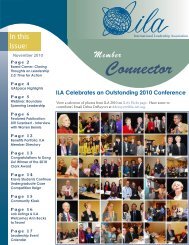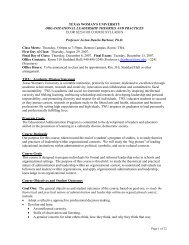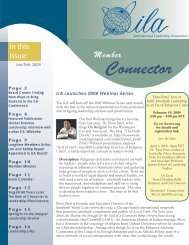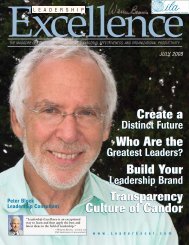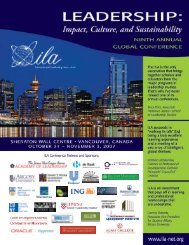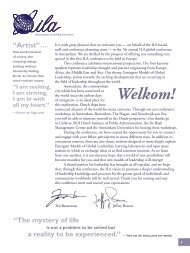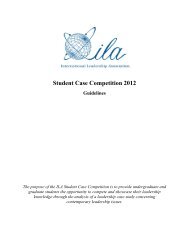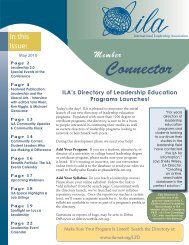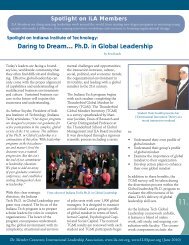Prague, Czech Republic - International Leadership Association
Prague, Czech Republic - International Leadership Association
Prague, Czech Republic - International Leadership Association
Create successful ePaper yourself
Turn your PDF publications into a flip-book with our unique Google optimized e-Paper software.
Promising Results: Using Guiding Questions to Design or Review <strong>Leadership</strong><br />
Education Programs<br />
TrIdA MAsArYK (NYU-<strong>Prague</strong>) / Session Type: PAnEL dIsCussIOn / Accepted by MIG(s): EduCATIOn<br />
appropriate design and redesign of programs, responses to accreditation agencies, and academic legitimacy concerns are<br />
critical challenges faced by leadership education programs. learn how to use Guiding Questions: Guidelines for <strong>Leadership</strong><br />
Education programs, a member initiated Ila project, to address these challenges. presenters will focus on field test results,<br />
related questions, and discussion with the audience of ideas for further uses.<br />
* Thomas Mengel Renaissance College, University of New Brunswick<br />
* Kathleen Patterson School of Global <strong>Leadership</strong> and Entrepreneurship, Regent University<br />
* Lisa Ncube Purdue University<br />
* Laura Osteen Florida State University<br />
chair: Stephen Ritch University of South Florida St. Petersburg<br />
. . . . . . . . . . . . . . . . . . . . . . . . . . . . . . . . . . . . . . . . . . . . . . . . . . . . . . . . . . . . . . . . . . . . . . . . . . . . . . . . . . . . . . . . . . . . . . . . . . . . . . . . . . . . . . . . . . . . . . . . . . . . . . . . . . . . . . . . . . . . . . . . . . . . . . . . . . . . . . . . . . . . .<br />
Philosophy as <strong>Leadership</strong><br />
dIAnA (InterContinental Praha) / Session Type: PAPEr PrEsEnTATIOns / Accepted by MIG(s): sChOLArshIP<br />
Many social movements use philosophy as a touchstone. their philosophers provoke and guide the activities that change<br />
communities. this panel presents four philosophers from central europe, whose speeches and writings promise to enrich<br />
current deliberations about leadership and the range of possible responses to perceived crisis, offering lessons to leadership<br />
scholars, educators, and practitioners.<br />
The Role of the Philosopher in Times of Transformation: Pneumopathology and the<br />
<strong>Czech</strong> Philosopher Jan Patoćka<br />
a leader of charter 77 was a philosopher named of Jan patoćka whose example demonstrates a role for philosophers<br />
repudiating an intolerable regime. through his efforts, both secretly and then publicly in defiance, patoćka taught as much<br />
by example as through his words. this paper details his heroic story and suggests what it means for leadership.<br />
* Nathan Harter Purdue University<br />
Transformation of <strong>Leadership</strong> = Annihilation of <strong>Leadership</strong>: A Nietzschean Perspective<br />
leadership studies emphasizes that the leader brings order out of chaos. Is it that simple? studying friedrich nietzsche<br />
suggests a new path: leadership must die or be annihilated. the paper asserts that the annihilation of leadership allows<br />
cultures to develop new values and sense of morality, which allows for a successful transformation.<br />
* Jean Robert Hunter Deuling RopeMedia<br />
Towards Living in the Truth: Transforming the Human Condition as Explored in the Words and<br />
<strong>Leadership</strong> of Václav Havel<br />
václav havel, former czech republic president, defined “living in the truth” as an attempt to regain control and affirm our<br />
human identity, speaking in terms of an authentic self and moral responsibility. this presenter will explore what can be<br />
learned about authentic leadership, the human condition, and transformation within havel’s example.<br />
* Alicia Crumpton 2 Cats Consulting LLC<br />
Natality as <strong>Leadership</strong> for Transformation: Orienting the Influence for Change<br />
arendt's concept of natality, where by virtue of having been born we inherently desire newness and surprise, is the<br />
foundation for leading transformation now. not a means to an end, natality as leadership for transformation interrupts the<br />
status quo with expectancy and novelty. this paper examines how natality influences change.<br />
* Gilda Warden Child Study and Treatment Center<br />
chair: Nathan Harter Purdue University<br />
commenTaTor: Corné Bekker Regent University<br />
. . . . . . . . . . . . . . . . . . . . . . . . . . . . . . . . . . . . . . . . . . . . . . . . . . . . . . . . . . . . . . . . . . . . . . . . . . . . . . . . . . . . . . . . . . . . . . . . . . . . . . . . . . . . . . . . . . . . . . . . . . . . . . . . . . . . . . . . . . . . . . . . . . . . . . . . . . . . . . . . . . . . .<br />
CS6FRIday<br />
15:00 – 16:30<br />
[ 51 ]


